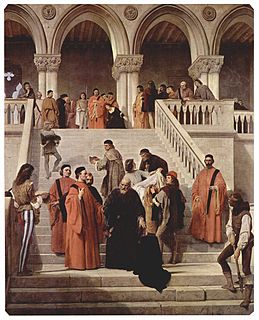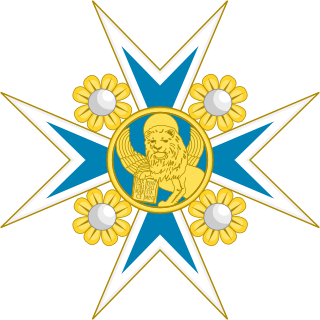
The Full College (Venetian : Pien Collegio) was the main executive body of the Republic of Venice, overseeing day-to-day governance and preparing the agenda for the Venetian Senate.

The Full College (Venetian : Pien Collegio) was the main executive body of the Republic of Venice, overseeing day-to-day governance and preparing the agenda for the Venetian Senate.
The Full College comprised the Doge of Venice and the rest of the Signoria—the six ducal councillors and the three heads of the Council of Forty—as well as three sets of savi ('sages'), boards with particular responsibilities: the six Savi del Consiglio , the five Savi di Terraferma (responsible for financial and military affairs), and the Savi agli Ordini (responsible for maritime matters). [1] As with other higher magistracies of Venice, restrictions were placed on the eligibility to the office for the savi: the members were elected from the Venetian Senate, served a term of six months, and could not be re-elected to the same office for three or six months thereafter. To ensure continuity, the appointments to the office of savio were staggered, with six-month tenures beginning on 1 October, 1 January, 1 April, and 1 July. [1]
The College met daily, under the presidency of the Doge, but with the Savi del Consiglio setting its agenda. [2] The council read reports and dispatches, gave audience to foreign envoys, and prepared all issues to come to a vote before the Senate. [2] On its own discretion, particularly on pressing matters of finance or foreign affairs, the College could instead send motions to be voted by the Council of Ten. [2]
The College had the authority to dispose of public funds to the sum of 25 gold ducats in total. [3] Along with the board of the Consultori in Iure , the College was also responsible for relations with the Church, including the reception of bishops and prelates visiting Venice. [3] It adjudicated in matters of Church benefits and patronages, the privileges of the Republic's subject cities, and the duties of the salt tax (gabelle). [3]
The power of the College rose from 1526 on, when it received the privilege of withholding from the Senate any acts it deemed as necessary to be kept secret. [3] Along with the College also received the authority to issue decrees when the Senate was not in session, as well as to suspend decrees of the Great Council (provided that this measure was justified during the council's next session), by the 18th century the College became the most influential institution of the Republic. [3]

The Council of Ten, or simply the Ten, was from 1310 to 1797 one of the major governing bodies of the Republic of Venice. Elections took place annually and the Council of Ten had the power to impose punishments upon nobles. The Council of Ten had a broad jurisdictional mandate over matters of state security. The Council of Ten and the Full College constituted the inner circle of oligarchical patricians who effectively ruled the Republic of Venice.

The office of Procurator of Saint Mark was one of the few lifetime appointments in the government of the Venetian Republic and was considered second only to that of the doge in prestige. It was routinely occupied by nobles belonging to the most influential families and typically represented the climax of a distinguished political career, although it was often an intermediate position prior to election as doge.

The Senate, formally the Consiglio dei Pregadi or Rogati, was the main deliberative and legislative body of the Republic of Venice.

The Great Council or Major Council was a political organ of the Republic of Venice between 1172 and 1797. It was the chief political assembly, responsible for electing many of the other political offices and the senior councils that ran the Republic, passing laws, and exercising judicial oversight. Following the lockout of 1297, its membership was established on hereditary right, exclusive to the patrician families enrolled in the Golden Book of the Venetian nobility.
The Council of Forty, also known as the Quarantia, was one of the highest constitutional bodies of the Republic of Venice, with both legal and political functions as the supreme court.
The Avogadori de Comùn, literally "public prosecutors", were an institution of the Republic of Venice. The Avogadori were responsible for taking care of and defend the interests of the Commune Veneciarum, meaning the union of noble families in the Government of Venice, in a manner similar to that of a modern State Attorney.

The Minor Council or Ducal Council was one of the main constitutional bodies of the Republic of Venice, and served both as advisors and partners to the Doge of Venice, sharing and limiting his authority.

The Order of Saint Mark was the sole order of chivalry of the Republic of Venice. It was named in honour of Venice's patron saint, Mark the Evangelist.

The Venetian navy was the navy of the Venetian Republic which played an important role in the history of the republic and the Mediterranean world. It was the premier navy in the Mediterranean Sea for many centuries between the medieval and early modern periods, providing Venice with control and influence over trade and politics far in excess of the republic's size and population. It was one of the first navies to mount gunpowder weapons aboard ships, and through an organised system of naval dockyards, armouries and chandlers was able to continually keep ships at sea and rapidly replace losses. The Venetian Arsenal was one of the greatest concentrations of industrial capacity prior to the Industrial Revolution and responsible for the bulk of the republic's naval power.
The Savii or Savi del Consiglio dei Pregadi, also known as the Savi[i] Grandi, were senior magistrates of the Republic of Venice.
The Savii or Savi di Terraferma was a board of five senior magistrates of the Republic of Venice, initially charged with the defence of the Republic's possessions in the Italian mainland. Gradually they assumed specific roles pertaining to the supervision of public finances, the military administration, state ceremonies, and urgent ad hoc matters.
The Captain of the Gulf was a senior naval command of the Republic of Venice.

The Magistrato alla Sanità was the office of the Republic of Venice definitively instituted in 1490 to manage public health in the city of Venice and its territories, with specific attention on preventing the spread of epidemics within the maritime republic. The magistracy was among the first health authorities in Europe to institute public inoculation projects to prevent the spread of infectious diseases.
The Savi[i] agli Ordini or Savi ai Ordini were senior magistrates of the Republic of Venice, charged with supervision of maritime matters, including commerce, the Venetian navy and the Republic's oversees colonies.

The Riformatori dello studio di Padova, also Riformatori allo studio di Padova, were the three officials of the Venetian Republic responsible for overseeing education and culture. Created in 1517, initially to reopen the University of Padua after the War of the League of Cambrai, they became responsible over time for public and private schooling at all levels, public libraries in Venice and Padua, intellectual academies, and professional schools. They also reviewed and authorized for publication all books within the mainland territory of Venice.
The Venetian Inquisition, formally the Holy Office, was the tribunal established jointly by the Venetian government and the Roman Catholic Church to repress heresy throughout the Republic of Venice. The inquisition also intervened in cases of sacrilege, apostasy, prohibited books, superstition, and witchcraft. It was established in the 16th-century and was abolished in 1797.
Giorgio Loredan was a Venetian nobleman, admiral, military general and politician of the Loredan family, known for investigating political crimes and scandals as head of the Council of Ten.
The Magistrato alle Pompe was a government department of the Republic of Venice responsible for upholding the Republic's sumptuary laws.
The Provveditori all'Armar were officials of the Republic of Venice responsible for the provisioning and equipment of the ships and crews of the Venetian navy.
The Camerlenghi di Comun were senior fiscal officials of the Republic of Venice.